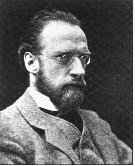HOLBROOKE (1878-1958):
The Composer of Light Music
by Philip L Scowcroft

Joseph (or Josef, as he was sometimes styled) Holbrooke is rarely
reckoned as a purveyor of the lighter musical forms. He is remembered,
if at all, (and his music is notorious for its neglect, both
in his lifetime and since) for his major works: at least eight
operas, including a trilogy The Cauldron of Annwn, concertos
for piano (2), violin and cello, at least eight symphonies,
not all of them published, plus several symphonic poems and
a large amount of chamber and piano solo music.
His father was however a music-hall pianist,
and the young Holbrooke composed many comic songs for that medium
from the age of 12. In the early 1920s when fox-trots became
the rage. he composed several, one of them rejoicing in the
title Let's Brighten Brighton.
He wrote widely for brass and military bands.
His brass band works mostly substantial, included a symphony
Wild Wales and Song of Llewellyn, but they were
not accepted into the repertoire, though Clive of India was
voted as the test piece for the 1940 'Open Championship'. And
his prolific output includes much that can be reckoned as being
in or near the mainstream of 'Light Music'.
Of his many songs, titles like Autumn,
Clown's Song, Come Not When I Am Dead, The
Garden, Summer Sweet, Sympathy, You Are
In Love and The World's Fair are effectively ballads;
he published at least a dozen drinking songs. Some of his large
corpus of chamber music was light and entertaining: the Miniature
Suite for wind quintet; a trio for piano, oboe d'amore (or
flute or clarinet) and viola subtitled Fairyland, and
most of his five string quartets - the second is subtitled Impressions
of Belgium - Russia etc the third is a humoresque The
Pickwick Club, in 13 short movements with titles like The
Amorous Tupman, The Picnic and Mrs. Bardell (its technical
difficulty outweighed its humour, and limited its popularity),
the fourth is a Suite On National Songs And Dances, the
fifth A Suite On Folksongs Of Great Britain; the latter
could be, and were, played by string orchestras. He was a fine
pianist and much of his later output, was 'serious' in character
but the charm of such things as Valse Alsacienne, the
valse caprice Three Blind Mice, the Three Bagatelles,
the twenty Jamaican Melodies, the intriguingly titled
Javanese Pepper Dance (even Ketèlbey did not go
farther afield in search of exotic colour!), the Gavotte
Elégante, Orientale, Scherzino, Clair
De Lune, An Enchanted Garden, the rather satirical
and epigrammatic Bogey Beasts even the Juliet Nocturne
I heard in recital recently, the valse de concert Talsarnau
and the Cambrian Ballades (entitled Dolgellau,
Penmachno, Tan-Y-Grisiau and Maentwrog - he lived
in North Wales for many years), entitle us to count them as
light music; the ten Mezzotints, which bear titles like
Syracuse, Palermo, Eilean Shona (Spring
Song) and Butterfly Of The Ballet, are attractive
musical picture postcards, several of which are reminiscences
of a Mediterranean cruise. Some of the Mezzotints were
orchestrated.
Holbrooke's other lighter orchestral compositions
included Souvenir De Printemps (arranged by H. M. Higgs).
Triumphal March and Imperial March, the Four
Dances op 20, Novelette, the Suite Pantomimique
and suite Dreamland, Scherzo And Rondo for
strings, a collection of Reels And Strathspeys, premiered
at Bournemouth, and sets of variations on Auld Lang Syne,
The Girl I Left Behind Me and first performed at the
Henry Wood Proms in 1900, The Three Blind Mice.
He composed music for several ballets of which
the best known in their day were The Moth And The Flame,
a suite from which was premiered at Bournemouth in 1931-32 and
the charming Aucassin Et Nicolette. Holbrooke's Saxophone
Concerto had a finale in jazz idiom. Thus, it can be seen that
Holbrooke, like almost all British (and doubtless other) composers,
'serious' or not, made substantial contributions to light music.
His are almost forgotten (though I have heard
one or two of the lighter piano pieces in live performance in
Doncaster recently) but not more so than his 'serious' music.
After all he did write mostly in a diatonic idiom which did
not get in the way of some pretty good tunes. And his often
whimsical ideas were as well suited to light music as to any
other sort.
Philip L Scowcroft
Return to index